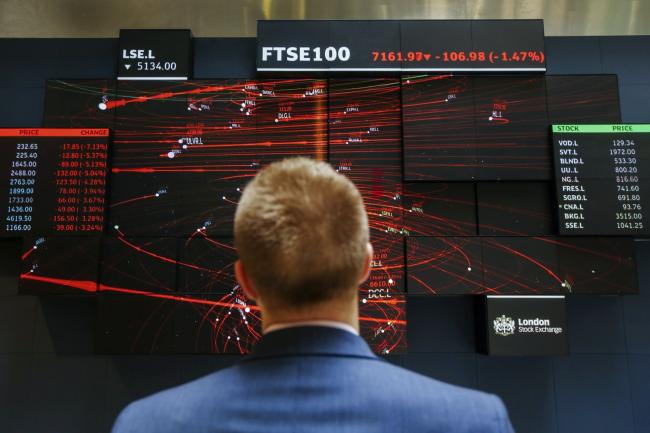(Bloomberg) -- The U.K.’s most famous stock pickers are suffering record losses amid the coronavirus crisis.
The biggest fund managers saw their steepest drop in assets ever in the first quarter, losing as much as 43%, according to data compiled by Bloomberg and Morningstar Inc. Seven of the top 10 actively managed equity funds had record losses as the pandemic tore through markets, including those managed by Terry Smith, Nick Train and Invesco Ltd.’s Mark Barnett.
Managers who pick stocks the old-fashioned way are struggling to prove their worth in both bull and bear markets, after losing ground to cheaper passive rivals in recent years. Such funds’ selling point is that they often outperform when stock markets are down. But investors in active U.K. equity funds yanked 1.7 billion pounds ($2.1 billion) in March, the second-worst month on record, while passive funds pulled in 1.4 billion pounds, according to Calastone data.
“Active managers face the same problem going forward as they have for the last decade, namely justifying higher fees,” said Ben Yearsley, investment director at Shore Financial Planning. “Fund management companies will have to slim down and reduce costs to compete,” he said.
Investors the world over were blindsided by the coronavirus pandemic that left few unscathed in the first quarter, with the worst damage seen in March as the outbreak saw entire economies shut down and millions of jobs lost. In the U.K., the FTSE All-Share index lost 26% of its value over the three-month period.
The U.K.’s biggest actively managed equities fund, Smith’s 17.9 billion-pound Fundsmith, shed 11.2% of its assets in the first quarter from the previous three months, the data show. Train’s 5.4 billion-pound LF Lindsell Train U.K. Equity lost 19%, while Barnett’s 3.3 billion-pound Invesco High Income fund shed 43% of its assets. The data don’t show the split between performance losses and withdrawals.
Fundsmith saw outflows of 619 million pounds in the first quarter, representing 3.4% of the average assets under management, according to a spokeswoman for the firm. The fund is seeing inflows so far in April, she added. Spokeswomen for Invesco and Lindsell Train declined to comment.
The asset bleeding adds to recent pressures on the high-profile managers. In December, two of Train’s funds were downgraded on concerns they were getting too big. Morningstar lowered the U.K. Equity Fund’s rating, citing its large size and concentrated stock picking.
Barnett experienced a similar downgrade from the rating agency a month earlier, with Morningstar citing concerns over the exposure to less liquid securities and a similar investing style to that of his former mentor, disgraced fund manager Neil Woodford. Invesco has moved to dump all the unlisted companies in Barnett’s funds amid the unprecedented market swings.
“With March proving to be a shockingly bad month for markets, I’m not that surprised that active managers saw huge outflows as investors looked to take risk off the table,” said Ryan Hughes, head of active portfolios at AJ Bell Plc.
The extreme volatility shook investors, many of which put money to work in the last few years and have only known a bull market, he said.
©2020 Bloomberg L.P.
